Nearly nine-in-ten Americans (88%) now say the coronavirus outbreak is a major threat to the U.S. economy and 66% say it’s a major threat to the health of the U.S. population as a whole. Both shares are nearly 20 percentage points higher than they were earlier this month, in a survey fielded March 10-16.
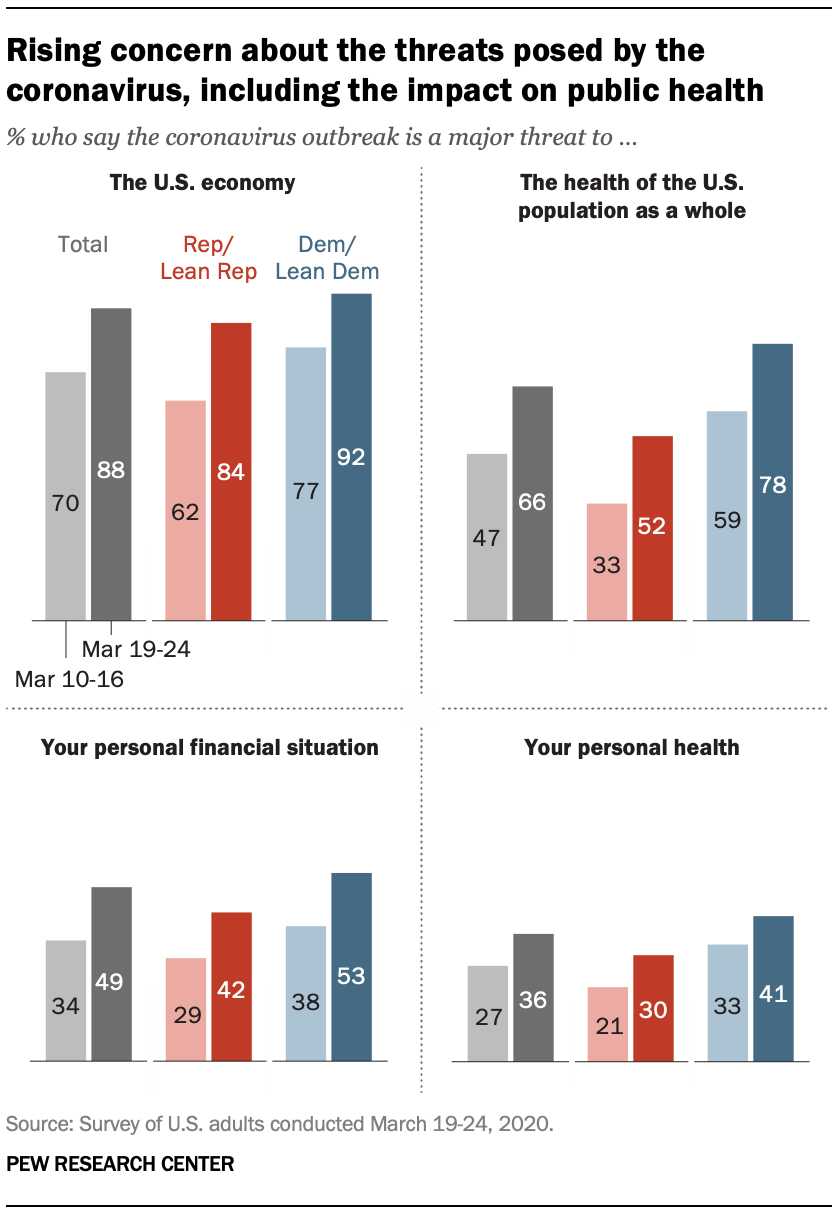 The public continues to see the coronavirus outbreak as presenting more serious threats to the nation than to them personally.
The public continues to see the coronavirus outbreak as presenting more serious threats to the nation than to them personally.
About half (49%) say the virus is a major threat to their own personal finances; another 40% say it is a minor threat. When it comes to personal health, more say the coronavirus presents a minor (52%) than major (36%) threat.
Compared with national concerns, fewer say the coronavirus is a major threat to their own finances and health, but these shares also are up significantly from a few weeks ago. The public has become 15 points more likely to say the virus is a major threat to their finances, and they are 9 points more likely to say it’s a major threat to their own health.
Democrats and Democratic leaners remain more likely than Republicans and Republican leaners to say the coronavirus outbreak is a major threat across all four areas of concern tested in the survey. For instance, 78% of Democrats say the coronavirus is a major threat to the health of the U.S. public, compared with 52% of Republicans. However, over the past few weeks, both groups have become significantly more likely to say the virus presents major threats to all four items in the survey.
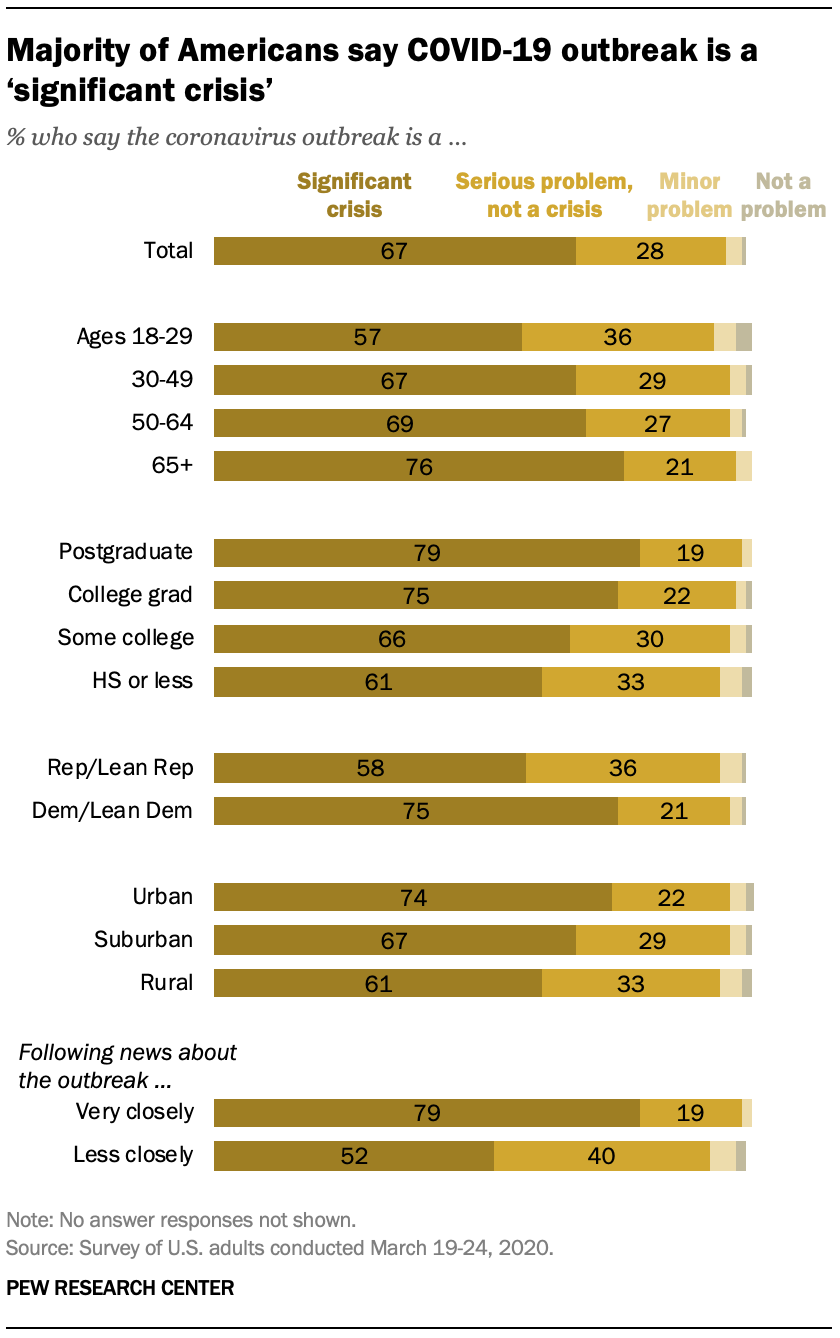 Reflecting widespread concerns about the threats posed by the coronavirus, 67% describe the outbreak as a significant crisis; far fewer describe it as a serious problem, but not a crisis (28%), and just 4% say it is a minor problem or not a problem at all.
Reflecting widespread concerns about the threats posed by the coronavirus, 67% describe the outbreak as a significant crisis; far fewer describe it as a serious problem, but not a crisis (28%), and just 4% say it is a minor problem or not a problem at all.
A larger share of Democrats (75%) than Republicans (58%) view the outbreak as a significant crisis for the country.
Older people (ages 65 and older), those with at least a college education, those following news about the outbreak very closely and people in urban areas are especially likely to describe the coronavirus outbreak in the most serious terms and call it a significant crisis.
The national – and personal – economic impacts of the coronavirus
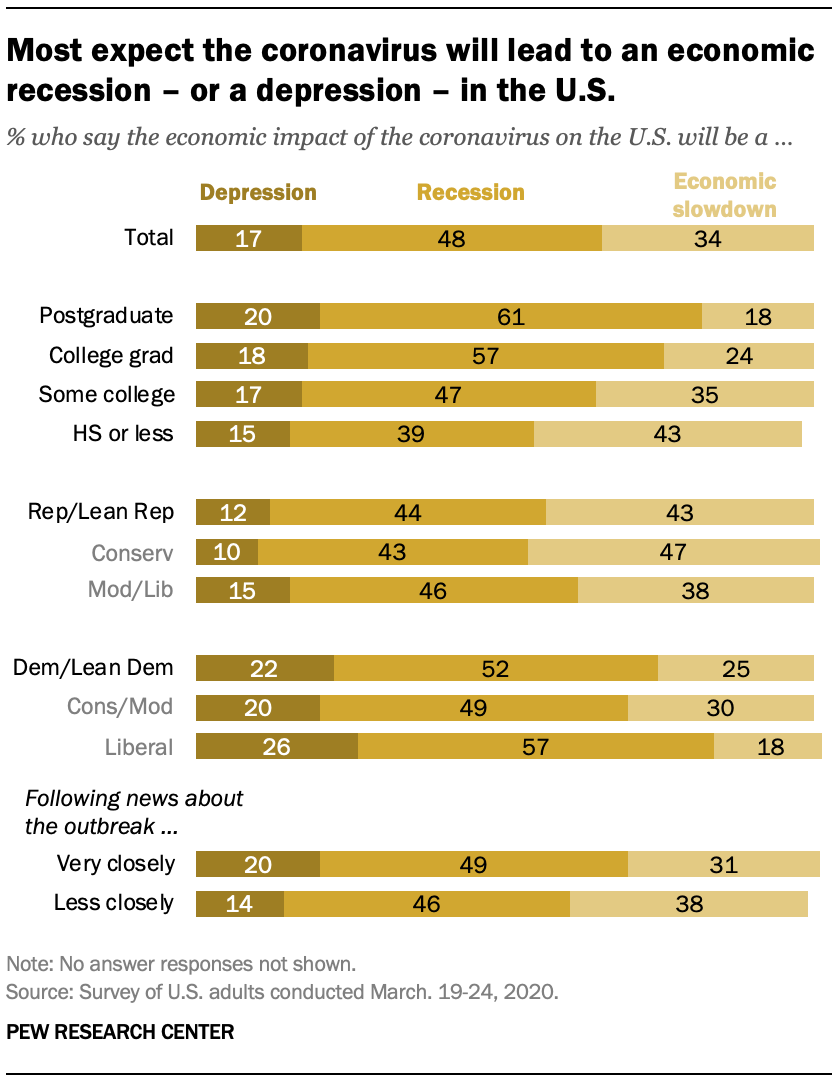 Asked to consider the economic impact of the coronavirus on the U.S., nearly half (48%) say it will cause a recession, while another 17% think it will cause a depression. About a third (34%) expect a less severe economic impact and say the coronavirus will result in an economic slowdown, but not a recession or depression.
Asked to consider the economic impact of the coronavirus on the U.S., nearly half (48%) say it will cause a recession, while another 17% think it will cause a depression. About a third (34%) expect a less severe economic impact and say the coronavirus will result in an economic slowdown, but not a recession or depression.
Republicans and Republican leaners are less likely to expect a severe economic impact than Democrats and Democratic leaners, though majorities of both groups expect the U.S. to suffer a recession or a depression.
More than four-in-ten Republicans (44%) say the coronavirus outbreak will lead to a recession, while another 12% say it will result in a depression. Among Democrats 52% say they expect a recession, while 22% say the outbreak will lead to a depression.
Those with higher levels of education are more likely than those with lower levels to expect severe national economic impacts. For instance, about eight-in-ten with a postgraduate degree (81%) expect either a recession (61%) or depression (20%) in the U.S. Among those with no college experience, 54% expect either a recession (39%) or depression (15%).
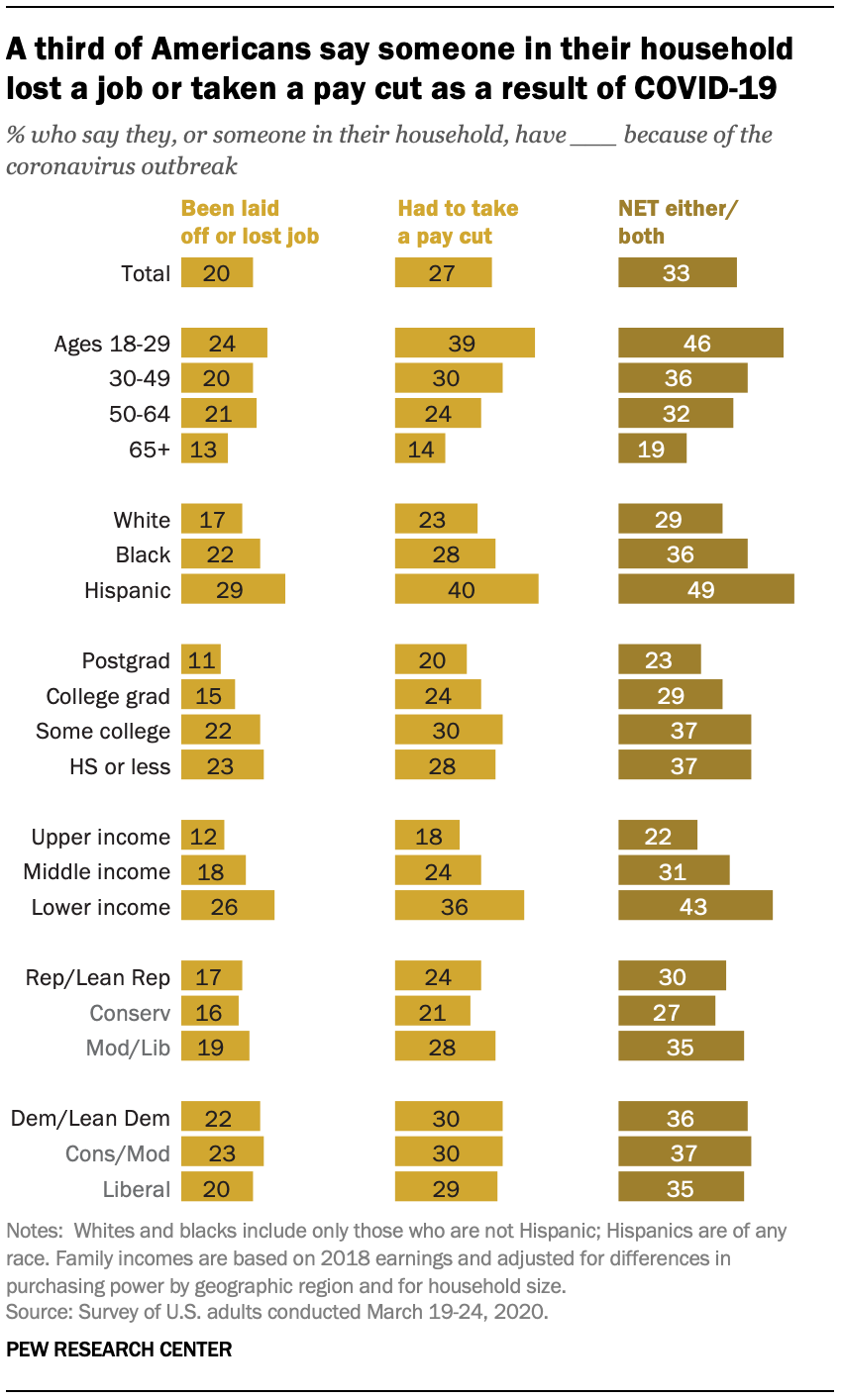 Americans have already begun to experience negative job impacts from the coronavirus outbreak. Overall, 20% say they, or someone in their household, have been laid off or lost a job because of the coronavirus; 27% say a member of their household has experienced a pay cut or a reduction in work hours.
Americans have already begun to experience negative job impacts from the coronavirus outbreak. Overall, 20% say they, or someone in their household, have been laid off or lost a job because of the coronavirus; 27% say a member of their household has experienced a pay cut or a reduction in work hours.
Taken together, 33% say they, or someone in their household, have lost a job or taken a pay cut (or both) because of the coronavirus outbreak.
Hispanics, younger people and lower-income people have been hit especially hard by coronavirus job impacts.
Nearly half of Hispanics (49%) say their household has had someone lose their job or take a pay cut because of the COVID-19 outbreak. Smaller shares of black (36%) and white (29%) people say the same.
Among the youngest adults, ages 18 to 29, 46% say they or someone in their household has lost a job or had their pay cut because of the coronavirus outbreak. Smaller shares of those ages 30 to 49 (36%), 50 to 64 (32%) and 65 and older (19%) say their household has faced either or both of these setbacks.
Lower-income Americans are almost twice as likely as upper-income Americans to say they or someone in their household has taken a pay cut or lost a job because of the coronavirus (43% vs. 22%). About a third (31%) of middle-income people say this has happened to them or someone in their household. (See appendix for more details on how income tiers are defined.)
Views on the personal health threat posed by the coronavirus
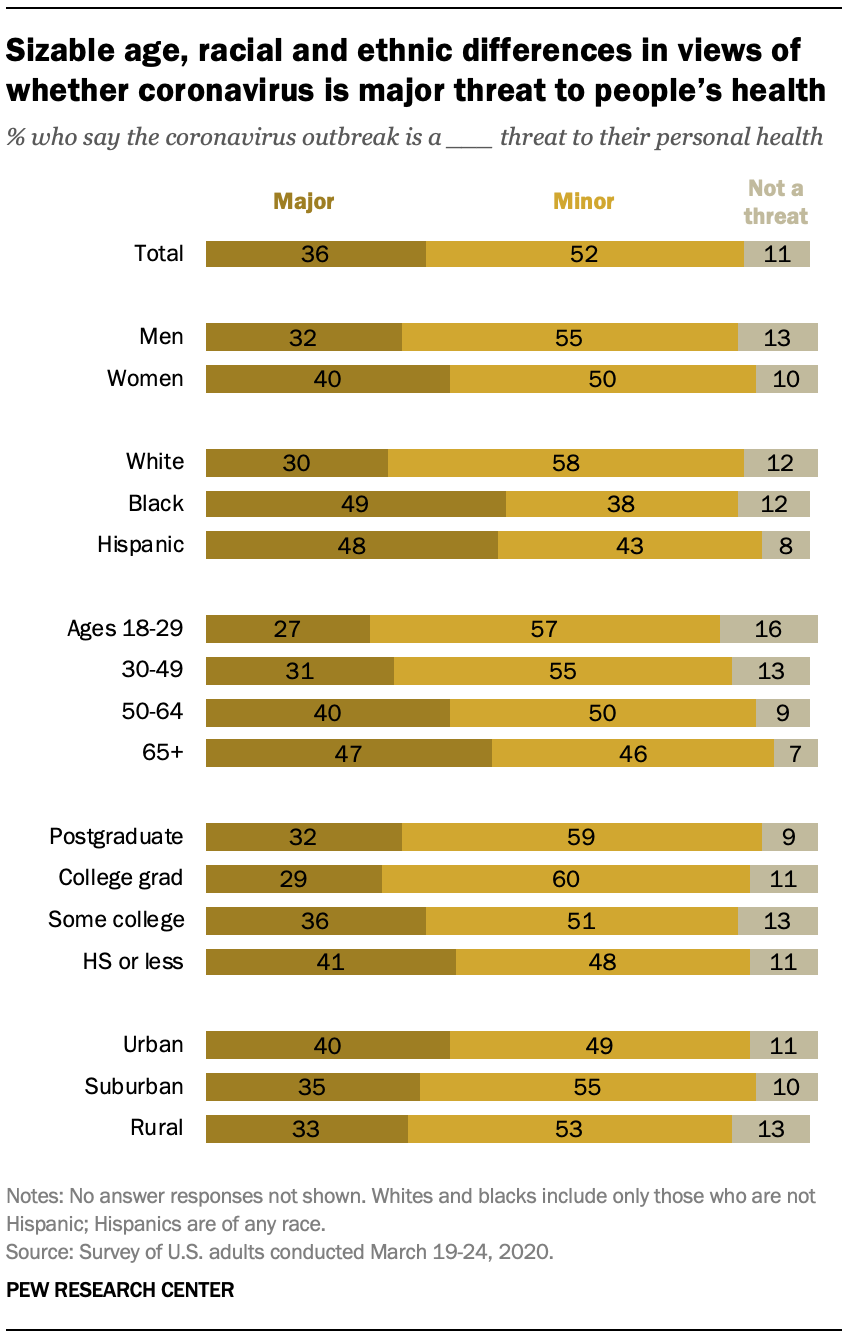 Most Americans view the coronavirus as a threat to their own personal health, though more view it as a minor (52%) than major (36%) threat; just 11% say it is not a threat.
Most Americans view the coronavirus as a threat to their own personal health, though more view it as a minor (52%) than major (36%) threat; just 11% say it is not a threat.
Older adults and black and Hispanic people are especially likely to say the coronavirus is a major threat to their own personal health.
Nearly half of black people (49%) and Hispanics (48%) say the coronavirus is a major threat to their own health. Among white people, 30% say this.
Adults ages 50 and older see a greater personal health threat from the coronavirus than those under age 50. Nearly half (47%) of those 65 and older and 40% of those ages 50 to 64 see the virus as a major threat to their own health; smaller shares of those ages 30 to 49 (31%) and 18 to 29 (27%) say the same.


